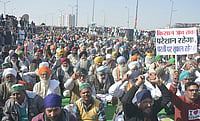In the latest outburst of anger against China's Zero Covid policy, residents in Guangzhou city on Monday night rose in revolt and attacked the police.
Residents broke the stay-at-home orders and overturned police vehicles and uprooted several barriers put up to restrict their movement.
Riots and attacks on police personnel or vehicles is extremely rare in China —almost unheard in recent years— as dissent is not allowed under the Communist Party of China's (CPC) ironfist control over its citizens and laws that neither allow free speech nor protests. However, the Zero Covid curbs and the economic and social disruption caused have pushed people to the edge, which is leading to unprecedented public defiance of Chinese state.
Footage of Guangzhou residents revolting against Xi Jinping's regim surfaced on social media, showing hundreds of people running on the roads over the barriers they have toppled. In another video, they are seen overturning a police vehicle.
The revolting residents were migrant workers who were ordered to stay at home because of Covid-19 outbreak in Guangzhou. It is not an isolated incident but the latest in the public defiance of Xi and his CPC in recent months.
What we know of Guangzhou revolt
Guangzhou is an industrial hub in southern China. The revolt took place in Guangzhou's Haizhu district.
China's is witnessing a surge in Covid-19 infections and almost a quarter of all cases are from Guangzhou. Of the total 17,772 new Covid-19 infections that China recorded on Tuesday, 5,100 were from Guangzhou. As a result, Guangzhou is under curbs mandated under China's Zero Covid policy.
These restrictions, while aimed at stopping infections, come at a great cost to common residents, who face shortage of food, lose income, and often fail to get medical care if they fall sick during lockdown.
Guangzhou's Haizhu district comprises migrant workers mostly engaged in construction, factories, and textile units. Therefore, they don't have the option to work remotely from their homes. Lockdowns mean they lose their daily wages even if they are not sick or not a contact of any sick person.
The BBC reported, "The area is home to many poorer itinerant labourers. They have complained of not being paid if they are unable to turn up for work, and of food shortages and skyrocketing prices while living under Covid control measures."
"Their circumstances can compound the hardship of the oppressive measures as the true number of residents needing supplies in a given housing block may be unclear to officials delivering goods," reported CNN.
Rumours have also added to the outrage among people who eventually rose in revolt on Monday. Rumours were circulating that testing companies were producing fake positive results in order to make money. Mandatory testing is often introduced in areas under lockdowns in China and several workplaces require regular, sometimes even daily, testing of employees.
Trouble across China over Zero Covid
Guangzhou is not the only place that's witnessing trouble at the moment.
Hebei provincial governmetn ended mass testing in Shijiazhuang city. Instead of relief, rumours following the announcement led to more panic.
Rumours in Hebei's Shijiazhuang city said the testing was being stopped so residents could be used as an experiment.
"This led to speculation that the population was going to be used, guinea-pig-style, to monitor what would happen if the virus was allowed to spread unchecked...Many panicking locals have stockpiled Chinese medicines which are said to help with Covid infection. Supplies in the city are said to have virtually run out for the moment," reported BBC.
In Chongqing city, 20 million people are in an informal undeclared lockdown, reported CNN. This unofficial lockdown is being called "voluntary static management".
"Around 20 million people in the heart of western China's mega city of Chongqing have been placed under a type of lockdown being referred to ironically by people as "voluntary static management". This is because, though there has been no official announcement, they've been told to remain indoors by community officials," reported CNN.
Long list of defiance of Zero Covid
These incidents are the latest in the long line of extremely rare —almost unheard in recent years— acts of defiance of Chinese regime.
In October, hundreds of Foxconn workers at its plant in Zhengzhou jumped fences to escape Covid-19 restrictions being imposed inside the plant. They walked hundreds of kilometres to their hometowns.
Footage of such escapes and long walks home have surfaced on the internet, with several reports claiming that they are forced to walk in the absence of any transport services.
Earlier in October, posters calling Xi a "traitor" and a "tyrant" appeared in Beijing. The posters called for the easing of restrictions under the Zero Covid policy and said people should have rights and should not be treated like slaves.
Nobtably, the banners appeared days before the CPC convened its 20th National Congress in which an unprecedented third presidential term was approved for Xi, which made Xi the most powerful leader in China since Mao Zedong.
A translation by CNN journalist Selina Wang of some of the slogans read as "Go on strike. Remove dictator and national traitor Xi Jinping" and "Say no to covid test, yes to food. No to lockdown, yes to freedom".
Economic impact of Zero Covid
Social unrest and unprecedent protests are not the only effects of China's Zero Covid policy. It has had serious economic implications too.
Under Zero Covid policies, neighbourhoods and entire cities are put under lockdowns and mass testing is carried out. The idea is to put everyone under homes in order to break the chain of transmission. It is in contrast to the 'living with the virus' approach followed in most of the world where targeted measures like isolation of the sick, tracing of their contact, and locking down of pockets of areas is followed instead of blanket lockdown of entire cities.
Some of the biggest economic hubs such as Shanghai, Beijing, and Zhengzhou have seen long periods of lockdowns, which not only brought economic production to halt but also put lots of strain on the Chinese economy as mass testing and lockdown enforcement is not cheap.
"In March, an estimated 345 million people across 46 cities were in full or partial lockdowns, a population accounting for 40 per cent of GDP," said the think tank Center for Strategic and International Studies (CSIS) in a report.
Economists warn that China needs to boost growth that sank to 2.5 per cent over a year earlier in the first half of 2022, less than half the official annual target of 5.5 per cent, after Shanghai and other industrial centers shut down starting in late March to fight Covid-19 outbreaks.
China's economy is at risk of stalling due to the impact of epidemic prevention and control policies, said think tank Anbound Research Center in a report.
The CSIS report cited above noted that mass testing, part of the Zero Covid policy, also comes at a huge financial cost — as much as 1.5 per cent of China's GDP.
"While the Chinese leadership believes that massively expanded mass testing will identify infections early and trigger measures to contain the outbreak without causing harmful disruption to the economy, it is still too early to know whether that approach will succeed. One thing is known: testing at this scale costs tens of billions of dollars, which may amount to 1.5 per cent or higher of China’s GDP," reported CSIS.


























